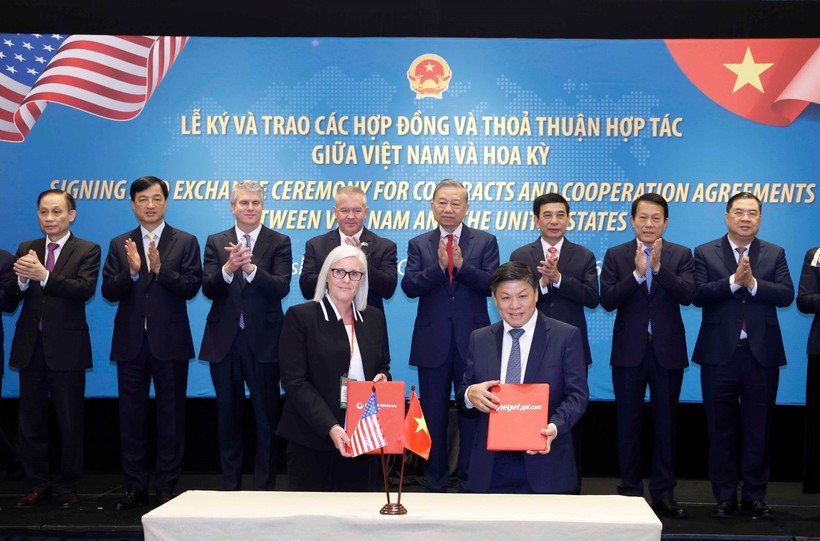Vietnam News Today (Jun. 6): Foreign Investment in Vietnam Surges in Five Months
| Vietnam News Today (Jun. 6) notable headlines Vietnam helps position SEARP as regional cooperation pillar with substantive impacts: Deputy FM Estonia considers Vietnam a key partner in Southeast Asia Foreign investment in Vietnam surges in five months PM Chinh lands in Estonia, starts first official visit by Vietnamese leader Vietnam, U.S. hold negotiation session on reciprocal trade agreement in Paris Vietnam launches 2025 sustainable business program Customs revenue from import-export activities rises 9.2% in five months Vietnam-China friendship tree planting ceremony held in Binh Duong Party chief eyes deeper ties with RoK |
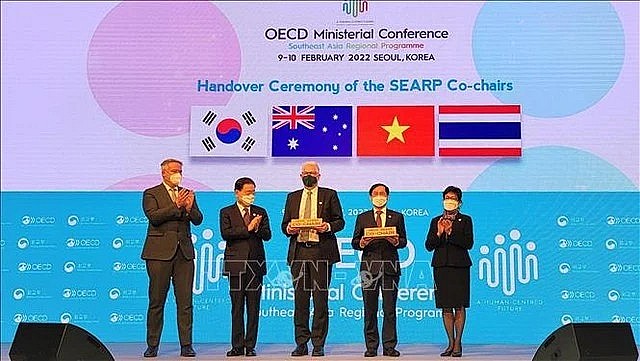 |
| Representatives of Vietnam (second from right) and Australia (center) receive the SEARP co-chairmanship at the handover ceremony in Seoul in February 2022. (Photo: VNA) |
Vietnam helps position SEARP as regional cooperation pillar with substantive impacts: Deputy FM
Vietnam, as a co-chair of the OECD Southeast Asia Regional Program (SEARP) for 2022-2025, has contributed to turning the initiative into a truly regional cooperation pillar with substantive impacts and long-term vision, according to Deputy Minister of Foreign Affairs Nguyen Minh Hang.
Speaking to the press on the occasion of Vietnam’s completion of its co-chairmanship, Hang said that SEARP is one of the Organization for Economic Co-operation and Development (OECD)’s five regional programs. It was launched in 2014 at the initiative of Japan to support economic reform across the Southeast Asian region through sharing development experience and promoting sustainable and inclusive economic growth via 13 collaboration areas.
Vietnam together with Australia led the program in an unprecedented challenging period marked by post-pandemic recovery, disrupted global supply chains, and increasingly severe climate-related disasters. Besides, the sweeping impacts of the Fourth Industrial Revolution, and breakthroughs in semiconductor and AI forced developing nations to renew their growth model and invest in science-technology as new breakthrough drivers.
In response to these dynamics, Hang said Vietnam and Australia worked with SEARP members to identify three strategic priorities. They identified that the focus should be channeled to supporting Southeast Asian countries to overcome short-term economic shocks by promoting appropriate fiscal and monetary policies, supporting micro, small and medium enterprises, and strengthening supply chain resilience.
Additionally, the initiative helped regional countries with carrying out structural reform to improve productivity, better business and investment climate, bolster innovation, and develop high-quality human resources towards sustainable and inclusive growth. Besides, it strengthened cooperation between Southeast Asian countries and OECD through sharing experience and applying OECD standards and best practices to help the countries align more closely with international standards on governance, transparency, and sustainable development, according to Hang.
Key cooperation areas included enhancing economic self-resilience against shocks, promoting reforms to support private sector recovery, expanding trade and investment, and advancing green and digital transformation.
Based on the agreed priorities, stakeholders implemented multiple activities, with the most notable being a Memorandum of Understanding between ASEAN and OECD, organization of regional ministerial-level forums on practical topics, and conducting extensive research, assessments, and economic reports while providing timely and appropriate recommendations, and delivering capacity-building programs for ASEAN nations.
SEARP, Hang noted, contributed to the regional economic recovery, elaborating the Southeast Asian region has become a bright spot for economic growth amidst global instability. Through specific activities like supporting small and medium enterprises' integration into global value chains, building digital infrastructure and developing digital economy, reforming tax systems and strengthening foreign investment attraction and management, and promoting green growth and circular economy, SEARP has served as a bridge promoting reform processes in regional countries towards alignment with world-class standards while encouraging deeper, more substantial cooperation with OECD.
Currently, Indonesia and Thailand have become the first Southeast Asian nations to initiate OECD membership negotiation roadmaps, she added.
The diplomat highlighted that with such robust results which have been acknowledged by OECD members and Southeast Asian countries, Vietnam has affirmed its role, positive contributions, responsibility as well as management and leadership capabilities at multilateral mechanisms, cited VNA.
At the SEARP co-chairmanship handover ceremony, the OECD Secretary-General underscored that under Vietnam and Australia's leadership, SEARP elevated the relationship between OECD and Southeast Asia to a new high.
The Deputy FM said Vietnam’s holding of an important position within a high-standard international organization like the OECD demonstrates a step to realize the foreign policy outlined at the 13th National Party Congress and in Directive 25-CT/TW on promoting and elevating multilateral diplomacy by 2030, issued by the Party Central Committee’s Secretariat.
Speaking on Vietnam’s experience as SEARP Co-Chair, she highlighted several key lessons, including the importance of proactively engaging in the shaping of multilateral institutions and the international political-economic order while stepping up the perfection of domestic policies, laws, and mechanisms to improve the capacity of implementing international commitments and agreements. These steps, she said, will help enhance Vietnam’s global standing and capitalize on every resource for development.
The official also highlighted the need to stay steadfast in the Party and State's consistent policy of proactively integrating into the world, elevating multilateral diplomacy, and deepening ties with reputable and influential international organizations, both regionally and globally, the official noted.
Besides, Vietnam’s impressive socio-economic achievements, including its internationally recognized resilience, fast recovery, and development after the pandemic, helped the country win support and active participation from all OECD members as well as Southeast Asian nations for its initiatives within SEARP.
Another lesson, she said, is maximising international resources. The invaluable and timely support from the OECD and member countries, especially Co-Chair Australia, in terms of both financial and technical resources, has enabled Vietnam to propose and advance ambitious cooperation programs and effectively fulfil its role as Co-Chair.
As Vietnam aims to become an upper-middle-income developing nation by 2030 and a developed country by 2045, Hang called for continued OECD support, particularly in economic reform, competitiveness improvement, investment attraction, and national governance aligned with global standards.
In the near term, Vietnam will keep coordinating with the OECD to fruitfully carry out the bilateral memorandum of understanding, work towards establishing an OECD country program for Vietnam, expand the country's participation in OECD specialized committees, and boost information sharing and economic reporting to help with the making of long-term development policies. The country is also laying groundwork for potential OECD membership, she said.
Looking ahead, Vietnam will work closely with Canada and the Philippines, SEARP co-chairs for 2025–2028, to foster a sustainable Southeast Asia further integrating into the international community, the Deputy FM continued, reaffirming Vietnam’s commitment to helping strengthen SEARP’s role as a vital bridge between the OECD and Southeast Asia, and also a contributor to a rules-based economic order and a greener, more sustainable, and more prosperous future.
Estonia considers Vietnam a key partner in Southeast Asia
Vietnam, as a co-chair of the OECD Southeast Asia Regional Program (SEARP) for 2022-2025, has contributed to turning the initiative into a truly regional cooperation pillar with substantive impacts and long-term vision, according to Deputy Minister of Foreign Affairs Nguyen Minh Hang.
Speaking to the press on the occasion of Vietnam’s completion of its co-chairmanship, Hang said that SEARP is one of the Organization for Economic Co-operation and Development (OECD)’s five regional programs. It was launched in 2014 at the initiative of Japan to support economic reform across the Southeast Asian region through sharing development experience and promoting sustainable and inclusive economic growth via 13 collaboration areas.
Vietnam together with Australia led the program in an unprecedented challenging period marked by post-pandemic recovery, disrupted global supply chains, and increasingly severe climate-related disasters. Besides, the sweeping impacts of the Fourth Industrial Revolution, and breakthroughs in semiconductor and AI forced developing nations to renew their growth model and invest in science-technology as new breakthrough drivers.
In response to these dynamics, Hang said Vietnam and Australia worked with SEARP members to identify three strategic priorities. They identified that the focus should be channeled to supporting Southeast Asian countries to overcome short-term economic shocks by promoting appropriate fiscal and monetary policies, supporting micro, small and medium enterprises, and strengthening supply chain resilience.
Additionally, the initiative helped regional countries with carrying out structural reform to improve productivity, better business and investment climate, bolster innovation, and develop high-quality human resources towards sustainable and inclusive growth. Besides, it strengthened cooperation between Southeast Asian countries and OECD through sharing experience and applying OECD standards and best practices to help the countries align more closely with international standards on governance, transparency, and sustainable development, according to Hang.
Key cooperation areas included enhancing economic self-resilience against shocks, promoting reforms to support private sector recovery, expanding trade and investment, and advancing green and digital transformation.
Based on the agreed priorities, stakeholders implemented multiple activities, with the most notable being a Memorandum of Understanding between ASEAN and OECD, organization of regional ministerial-level forums on practical topics, and conducting extensive research, assessments, and economic reports while providing timely and appropriate recommendations, and delivering capacity-building programs for ASEAN nations, according to VOV.
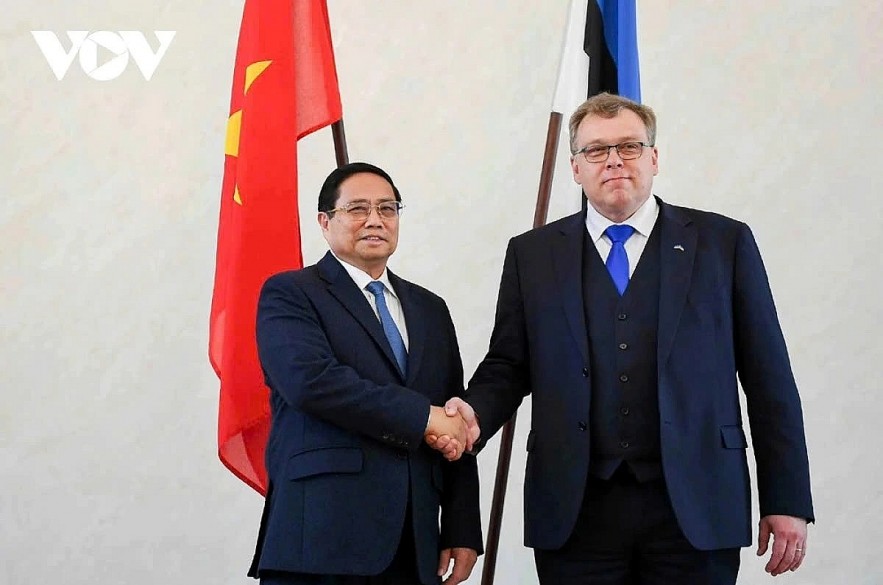 |
| Vietnamese Prime Minister Pham Minh Chinh (L) and Estonian Parliament Speaker Lauri Hussar during their meeting in Tallinn on June 5. |
SEARP, Hang noted, contributed to the regional economic recovery, elaborating the Southeast Asian region has become a bright spot for economic growth amidst global instability. Through specific activities like supporting small and medium enterprises' integration into global value chains, building digital infrastructure and developing digital economy, reforming tax systems and strengthening foreign investment attraction and management, and promoting green growth and circular economy, SEARP has served as a bridge promoting reform processes in regional countries towards alignment with world-class standards while encouraging deeper, more substantial cooperation with OECD.
Currently, Indonesia and Thailand have become the first Southeast Asian nations to initiate OECD membership negotiation roadmaps, she added.
The diplomat highlighted that with such robust results which have been acknowledged by OECD members and Southeast Asian countries, Vietnam has affirmed its role, positive contributions, responsibility as well as management and leadership capabilities at multilateral mechanisms.
At the SEARP co-chairmanship handover ceremony, the OECD Secretary-General underscored that under Vietnam and Australia's leadership, SEARP elevated the relationship between OECD and Southeast Asia to a new high.
The Deputy FM said Vietnam’s holding of an important position within a high-standard international organization like the OECD demonstrates a step to realize the foreign policy outlined at the 13th National Party Congress and in Directive 25-CT/TW on promoting and elevating multilateral diplomacy by 2030, issued by the Party Central Committee’s Secretariat.
Speaking on Vietnam’s experience as SEARP Co-Chair, she highlighted several key lessons, including the importance of proactively engaging in the shaping of multilateral institutions and the international political-economic order while stepping up the perfection of domestic policies, laws, and mechanisms to improve the capacity of implementing international commitments and agreements. These steps, she said, will help enhance Vietnam’s global standing and capitalize on every resource for development.
The official also highlighted the need to stay steadfast in the Party and State's consistent policy of proactively integrating into the world, elevating multilateral diplomacy, and deepening ties with reputable and influential international organizations, both regionally and globally, the official noted.
Besides, Vietnam’s impressive socio-economic achievements, including its internationally recognized resilience, fast recovery, and development after the pandemic, helped the country win support and active participation from all OECD members as well as Southeast Asian nations for its initiatives within SEARP.
Another lesson, she said, is maximising international resources. The invaluable and timely support from the OECD and member countries, especially Co-Chair Australia, in terms of both financial and technical resources, has enabled Vietnam to propose and advance ambitious cooperation programs and effectively fulfil its role as Co-Chair.
As Vietnam aims to become an upper-middle-income developing nation by 2030 and a developed country by 2045, Hang called for continued OECD support, particularly in economic reform, competitiveness improvement, investment attraction, and national governance aligned with global standards.
In the near term, Vietnam will keep coordinating with the OECD to fruitfully carry out the bilateral memorandum of understanding, work towards establishing an OECD country program for Vietnam, expand the country's participation in OECD specialized committees, and boost information sharing and economic reporting to help with the making of long-term development policies. The country is also laying groundwork for potential OECD membership, she said.
Looking ahead, Vietnam will work closely with Canada and the Philippines, SEARP co-chairs for 2025–2028, to foster a sustainable Southeast Asia further integrating into the international community, the Deputy FM continued, reaffirming Vietnam’s commitment to helping strengthen SEARP’s role as a vital bridge between the OECD and Southeast Asia, and also a contributor to a rules-based economic order and a greener, more sustainable, and more prosperous future.
Foreign investment in Vietnam surges in five months
Vietnam, as a co-chair of the OECD Southeast Asia Regional Program (SEARP) for 2022-2025, has contributed to turning the initiative into a truly regional cooperation pillar with substantive impacts and long-term vision, according to Deputy Minister of Foreign Affairs Nguyen Minh Hang.
Speaking to the press on the occasion of Vietnam’s completion of its co-chairmanship, Hang said that SEARP is one of the Organization for Economic Co-operation and Development (OECD)’s five regional programs. It was launched in 2014 at the initiative of Japan to support economic reform across the Southeast Asian region through sharing development experience and promoting sustainable and inclusive economic growth via 13 collaboration areas.
Vietnam together with Australia led the program in an unprecedented challenging period marked by post-pandemic recovery, disrupted global supply chains, and increasingly severe climate-related disasters. Besides, the sweeping impacts of the Fourth Industrial Revolution, and breakthroughs in semiconductor and AI forced developing nations to renew their growth model and invest in science-technology as new breakthrough drivers.
In response to these dynamics, Hang said Vietnam and Australia worked with SEARP members to identify three strategic priorities. They identified that the focus should be channeled to supporting Southeast Asian countries to overcome short-term economic shocks by promoting appropriate fiscal and monetary policies, supporting micro, small and medium enterprises, and strengthening supply chain resilience.
Additionally, the initiative helped regional countries with carrying out structural reform to improve productivity, better business and investment climate, bolster innovation, and develop high-quality human resources towards sustainable and inclusive growth. Besides, it strengthened cooperation between Southeast Asian countries and OECD through sharing experience and applying OECD standards and best practices to help the countries align more closely with international standards on governance, transparency, and sustainable development, according to Hang.
Key cooperation areas included enhancing economic self-resilience against shocks, promoting reforms to support private sector recovery, expanding trade and investment, and advancing green and digital transformation.
Based on the agreed priorities, stakeholders implemented multiple activities, with the most notable being a Memorandum of Understanding between ASEAN and OECD, organization of regional ministerial-level forums on practical topics, and conducting extensive research, assessments, and economic reports while providing timely and appropriate recommendations, and delivering capacity-building programs for ASEAN nations.
SEARP, Hang noted, contributed to the regional economic recovery, elaborating the Southeast Asian region has become a bright spot for economic growth amidst global instability. Through specific activities like supporting small and medium enterprises' integration into global value chains, building digital infrastructure and developing digital economy, reforming tax systems and strengthening foreign investment attraction and management, and promoting green growth and circular economy, SEARP has served as a bridge promoting reform processes in regional countries towards alignment with world-class standards while encouraging deeper, more substantial cooperation with OECD.
Currently, Indonesia and Thailand have become the first Southeast Asian nations to initiate OECD membership negotiation roadmaps, she added.
The diplomat highlighted that with such robust results which have been acknowledged by OECD members and Southeast Asian countries, Vietnam has affirmed its role, positive contributions, responsibility as well as management and leadership capabilities at multilateral mechanisms.
At the SEARP co-chairmanship handover ceremony, the OECD Secretary-General underscored that under Vietnam and Australia's leadership, SEARP elevated the relationship between OECD and Southeast Asia to a new high.
The Deputy FM said Vietnam’s holding of an important position within a high-standard international organization like the OECD demonstrates a step to realize the foreign policy outlined at the 13th National Party Congress and in Directive 25-CT/TW on promoting and elevating multilateral diplomacy by 2030, issued by the Party Central Committee’s Secretariat.
Speaking on Vietnam’s experience as SEARP Co-Chair, she highlighted several key lessons, including the importance of proactively engaging in the shaping of multilateral institutions and the international political-economic order while stepping up the perfection of domestic policies, laws, and mechanisms to improve the capacity of implementing international commitments and agreements. These steps, she said, will help enhance Vietnam’s global standing and capitalize on every resource for development.
The official also highlighted the need to stay steadfast in the Party and State's consistent policy of proactively integrating into the world, elevating multilateral diplomacy, and deepening ties with reputable and influential international organizations, both regionally and globally, the official noted.
Besides, Vietnam’s impressive socio-economic achievements, including its internationally recognized resilience, fast recovery, and development after the pandemic, helped the country win support and active participation from all OECD members as well as Southeast Asian nations for its initiatives within SEARP, according to VNA.
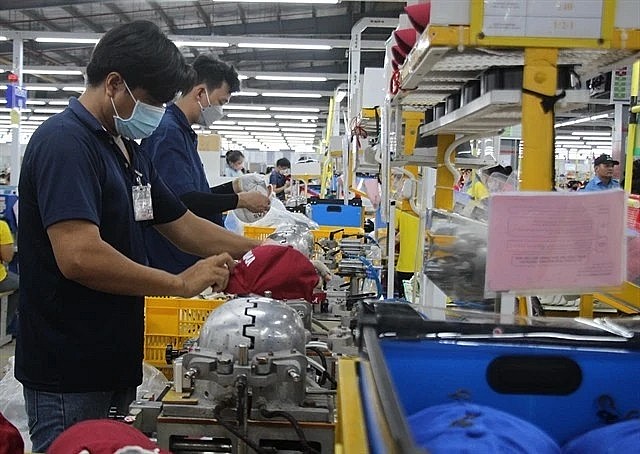 |
| A production line of the RoK-invested Unipax Vi Thanh Co in Hau Giang province. (Photo: VNA) |
Another lesson, she said, is maximising international resources. The invaluable and timely support from the OECD and member countries, especially Co-Chair Australia, in terms of both financial and technical resources, has enabled Vietnam to propose and advance ambitious cooperation programs and effectively fulfil its role as Co-Chair.
As Vietnam aims to become an upper-middle-income developing nation by 2030 and a developed country by 2045, Hang called for continued OECD support, particularly in economic reform, competitiveness improvement, investment attraction, and national governance aligned with global standards.
In the near term, Vietnam will keep coordinating with the OECD to fruitfully carry out the bilateral memorandum of understanding, work towards establishing an OECD country program for Vietnam, expand the country's participation in OECD specialized committees, and boost information sharing and economic reporting to help with the making of long-term development policies. The country is also laying groundwork for potential OECD membership, she said.
Looking ahead, Vietnam will work closely with Canada and the Philippines, SEARP co-chairs for 2025–2028, to foster a sustainable Southeast Asia further integrating into the international community, the Deputy FM continued, reaffirming Vietnam’s commitment to helping strengthen SEARP’s role as a vital bridge between the OECD and Southeast Asia, and also a contributor to a rules-based economic order and a greener, more sustainable, and more prosperous future.
PM Chinh lands in Estonia, starts first official visit by Vietnamese leader
After more than nine hours of flight, on the morning of June 5 local time (noon Hanoi time), Prime Minister Pham Minh Chinh, his spouse Le Thi Bich Tran, and the high-level Vietnamese delegation arrived in Tallinn, the capital of Estonia, officially beginning their visit to the Republic of Estonia.
Estonia is the first stop in Prime Minister Pham Minh Chinh’s working trip to attend the 3rd United Nations Ocean Conference, carry out bilateral activities in France, and pay official visits to Estonia and Sweden from June 5 to 14.
At Lennart Meri Tallinn Airport, Prime Minister Pham Minh Chinh, his spouse, and the Vietnamese delegation were welcomed by Hannes Hanso, Estonian Ambassador to China and concurrently accredited to Vietnam; Sven Tolp, Deputy Director of the Estonian State Protocol Department; and Pham Thi Thanh Binh, Vietnamese Ambassador to Finland and concurrently accredited to Estonia.
This marks the first official visit by a Vietnamese Prime Minister to Estonia since the two countries established diplomatic relations in 1992. The visit aims to enhance the friendship and multifaceted cooperation between Vietnam and Estonia and reaffirms Vietnam’s consistent policy of valuing and seeking to strengthen ties with European nations, including Estonia.
Estonia is a long-standing friendly partner with multifaceted cooperation with Vietnam. Over the 33 years of diplomatic relations, the two countries have conducted high-level exchanges and established a mechanism for political consultations at the deputy minister and department head levels.
During these exchanges, Estonia has repeatedly affirmed that Vietnam is a priority partner in Southeast Asia and expressed a desire to deepen cooperation. The two countries also actively coordinate and support each other in multilateral forums, VGP reported.
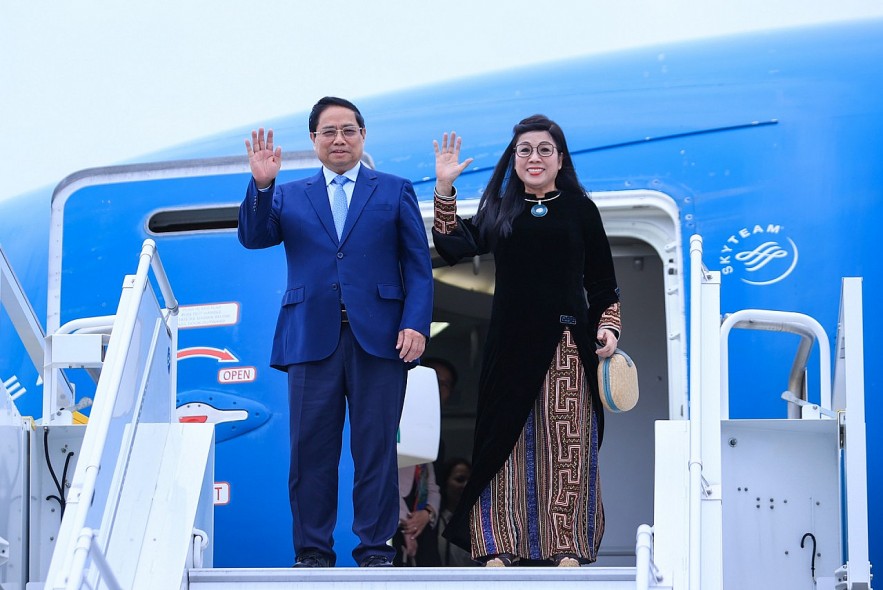 |
| On the morning of June 5 local time, Prime Minister Pham Minh Chinh, his spouse Le Thi Bich Tran, and the high-level Vietnamese delegation arrived in Tallinn to begin an official visit to the Republic of Estonia from June 5 to 7. Photo: VGP |
Estonia has actively supported Vietnam in signing the EU-Vietnam Free Trade Agreement (EVFTA) and was one of the first EU members to ratify the EU-Vietnam Investment Protection Agreement (EVIPA).
Although current economic and trade volumes remain modest, they have shown stable growth in recent years. Both sides are working to leverage the EVFTA to expand market access, especially in mutually beneficial sectors.
Estonia also contributed to Vietnam’s human resource development by training many students and researchers during the Soviet era and continues to cooperate with several Vietnamese universities in education.
During the visit, Prime Minister Pham Minh Chinh is expected to hold meetings with senior Estonian leaders, attend the Vietnam-Estonia Business Forum, and visit various Estonian economic, cultural, and social institutions.
Since joining the European Union in 2004, Estonia has made significant strides in socio-economic development and European integration, particularly as a leader in digital transformation and e-government.
This visit is expected to open new cooperation opportunities, particularly in information technology, digital transformation, artificial intelligence, fintech, digital economy, cybersecurity, smart logistics, digital seaports, and e-government development.
After more than nine hours of flight, on the morning of June 5 local time (noon Hanoi time), Prime Minister Pham Minh Chinh, his spouse Le Thi Bich Tran, and the high-level Vietnamese delegation arrived in Tallinn, the capital of Estonia, officially beginning their visit to the Republic of Estonia.
Estonia is the first stop in Prime Minister Pham Minh Chinh’s working trip to attend the 3rd United Nations Ocean Conference, carry out bilateral activities in France, and pay official visits to Estonia and Sweden from June 5 to 14.
At Lennart Meri Tallinn Airport, Prime Minister Pham Minh Chinh, his spouse, and the Vietnamese delegation were welcomed by Hannes Hanso, Estonian Ambassador to China and concurrently accredited to Vietnam; Sven Tolp, Deputy Director of the Estonian State Protocol Department; and Pham Thi Thanh Binh, Vietnamese Ambassador to Finland and concurrently accredited to Estonia.
This marks the first official visit by a Vietnamese Prime Minister to Estonia since the two countries established diplomatic relations in 1992. The visit aims to enhance the friendship and multifaceted cooperation between Vietnam and Estonia and reaffirms Vietnam’s consistent policy of valuing and seeking to strengthen ties with European nations, including Estonia.
Estonia is a long-standing friendly partner with multifaceted cooperation with Vietnam. Over the 33 years of diplomatic relations, the two countries have conducted high-level exchanges and established a mechanism for political consultations at the deputy minister and department head levels.
During these exchanges, Estonia has repeatedly affirmed that Vietnam is a priority partner in Southeast Asia and expressed a desire to deepen cooperation. The two countries also actively coordinate and support each other in multilateral forums.
Estonia has actively supported Vietnam in signing the EU-Vietnam Free Trade Agreement (EVFTA) and was one of the first EU members to ratify the EU-Vietnam Investment Protection Agreement (EVIPA).
Although current economic and trade volumes remain modest, they have shown stable growth in recent years. Both sides are working to leverage the EVFTA to expand market access, especially in mutually beneficial sectors.
Estonia also contributed to Vietnam’s human resource development by training many students and researchers during the Soviet era and continues to cooperate with several Vietnamese universities in education.
During the visit, Prime Minister Pham Minh Chinh is expected to hold meetings with senior Estonian leaders, attend the Vietnam-Estonia Business Forum, and visit various Estonian economic, cultural, and social institutions.
Since joining the European Union in 2004, Estonia has made significant strides in socio-economic development and European integration, particularly as a leader in digital transformation and e-government.
This visit is expected to open new cooperation opportunities, particularly in information technology, digital transformation, artificial intelligence, fintech, digital economy, cybersecurity, smart logistics, digital seaports, and e-government development.
Vietnam, U.S. hold negotiation session on reciprocal trade agreement in Paris
The session is part of the two countries' efforts to reach a reciprocal trade agreement between the two sides.
During the session, the two sides reviewed the implementation of the tasks following the second round of the technical-level negotiations and discussed the orientation for the upcoming technical negotiation round.
Minister Nguyen briefed about the key points in Vietnam's response documents regarding the additional issues raised by the U.S., affirming Vietnam's determination and goodwill in seeking for common grounds with the U.S.
Nguyen also suggested the U.S. reply to the issues raised by the Vietnamese side, VGP reported.
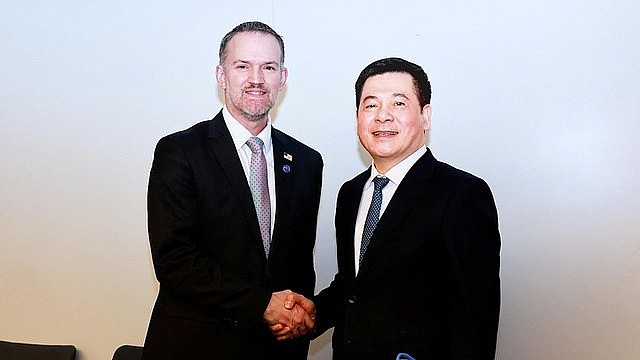 |
| Minister of Industry and Trade Nguyen Hong Dien (R) meets U.S. Trade Representative Jamieson Greer, Paris, France, June 4, 2025. |
For his part, Greer spoke highly of Vietnam's goodwill and approach in handling the issues concerned by the U.S., and acknowledged the efforts and constructive spirit of the Vietnamese negotiation delegation.
As Vietnam is a comprehensive strategic partner of the U.S., reaching an agreement with Vietnam on reciprocal tax policies is important not only for Vietnam but also for the U.S., he noted.
Both sides pledged to accelerate the pace of negotiations, with a particular focus on maximizing efforts to achieve the best possible outcome in the third round of technical-level negotiations.
They also agreed to assign their technical teams to intensify exchanges via online working sessions, in order to resolve as many outstanding technical issues as possible and create strong momentum for the third technical negotiation round, which is expected to take place in the first half of June 2025.
The two sides committed to enhancing close coordination and expressed their willingness to conduct further ministerial-level discussions to advance the negotiation process toward a mutually beneficial outcome.
 | Vietnam News Today (Jun. 2): Vietnam spotlights key issues to ensure global stability at Shangri-la Dialogue; Vietnamese trade mission sounds out business opportunities in United ... |
 | Vietnam News Today (Jun. 3): PM Pham Minh Chinh to Attend UN Ocean Conference, Visit Estonia, Sweden Vietnam News Today (Jun. 3): PM Pham Minh Chinh to attend UN Ocean Conference, visit Estonia, Sweden; Vietnam, Germany look to boost strategic partnership; HCM ... |
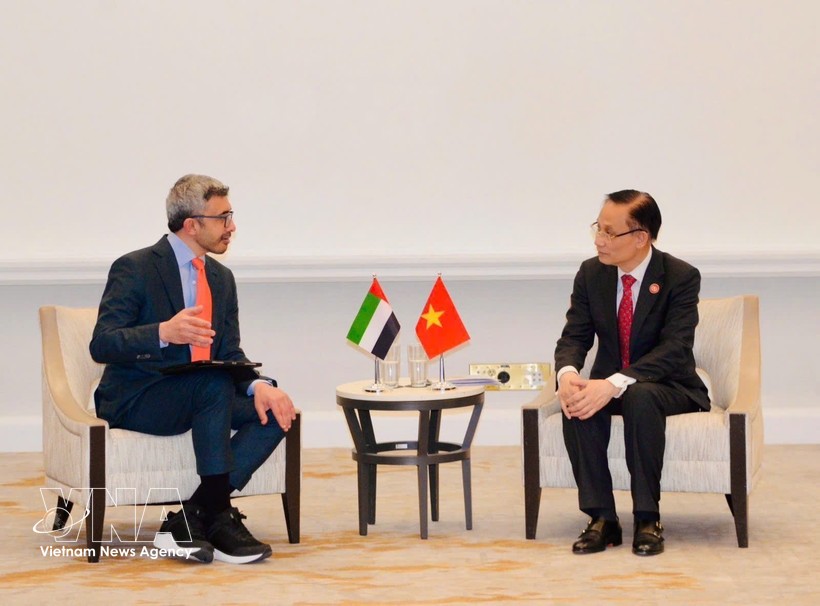 National
National
Vietnam News Today (Feb. 22): Vietnamese FM Meets Counterparts of UAE, Egypt and Türkiye
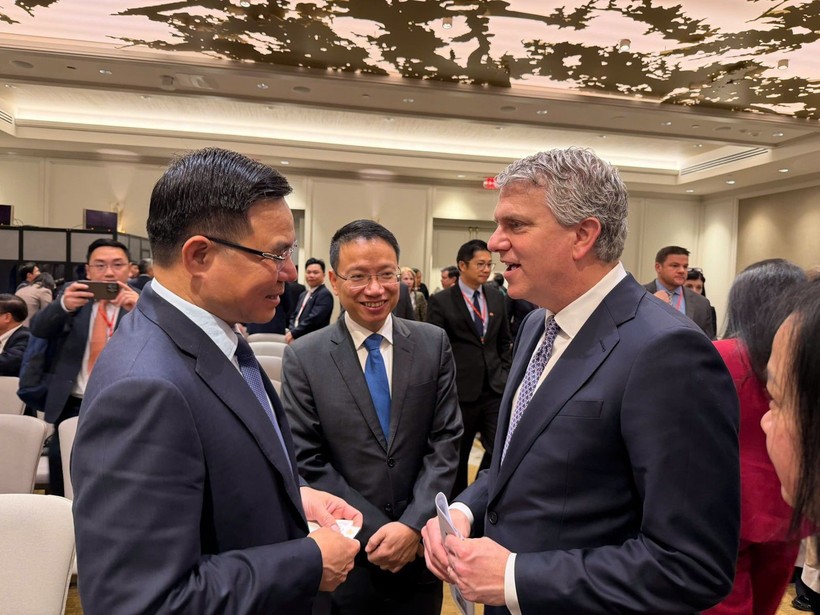 National
National
Vietnam News Today (Feb. 21): Vietnam, US Step Up Dialogue to Facilitate Trade Ties
Recommended
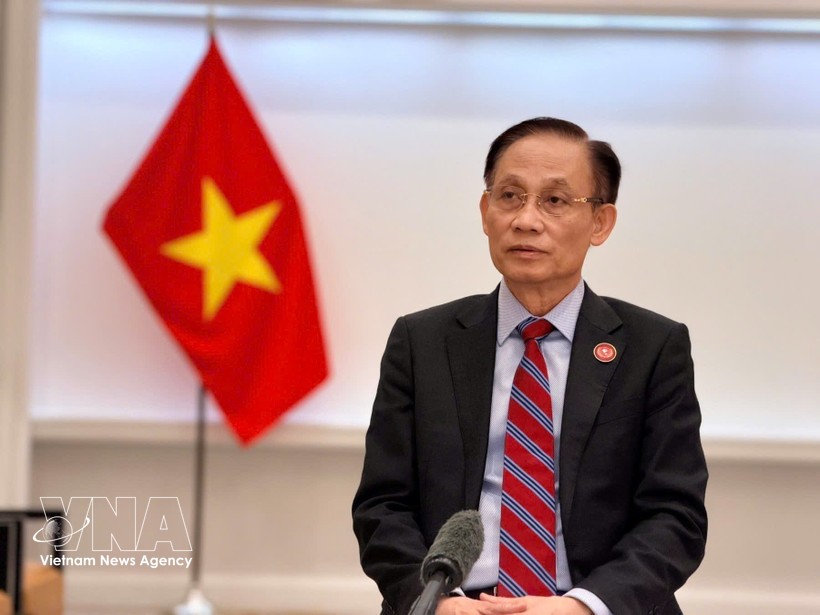 National
National
Party Chief’s US Trip Marks Milestone in High-level Multilateral Diplomacy: FM
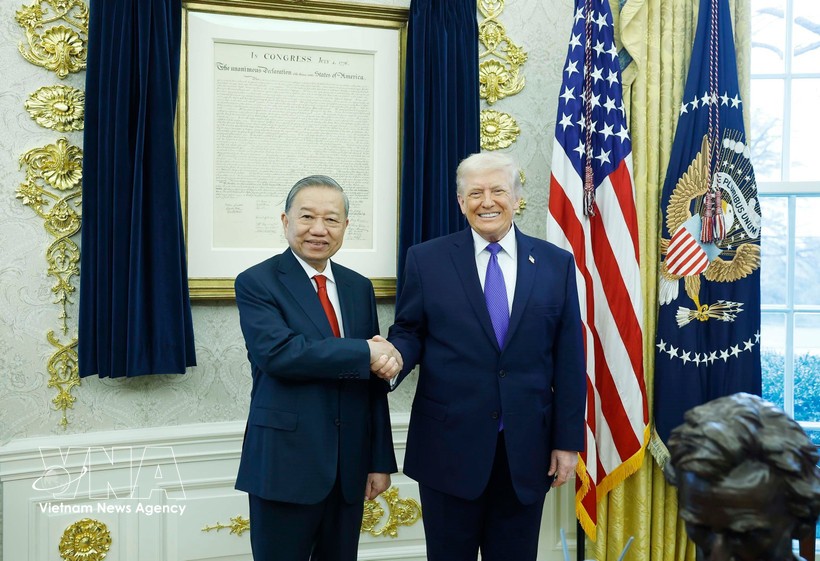 National
National
Party General Secretary To Lam Meets US President Donald Trump at White House
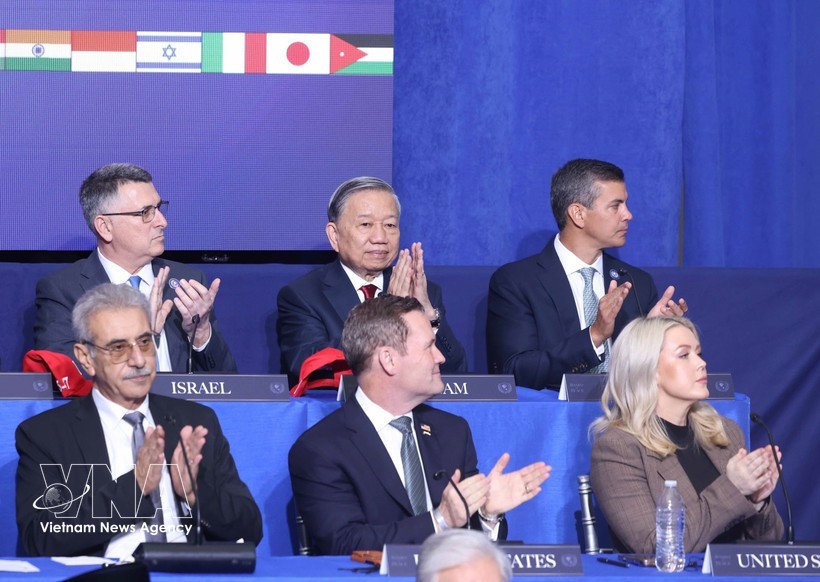 National
National
Party General Secretary To Lam Attends Inaugural Meeting of Gaza Board of Peace in US
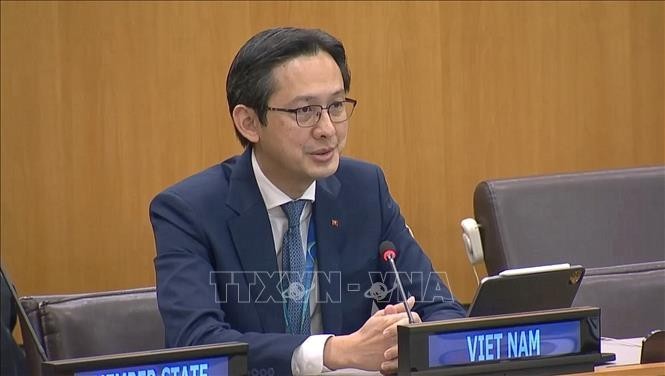 National
National
Vietnam Promotes Multilateral Dialogue on Nuclear Non-proliferation Ahead of the 2026 NPT Review Conference
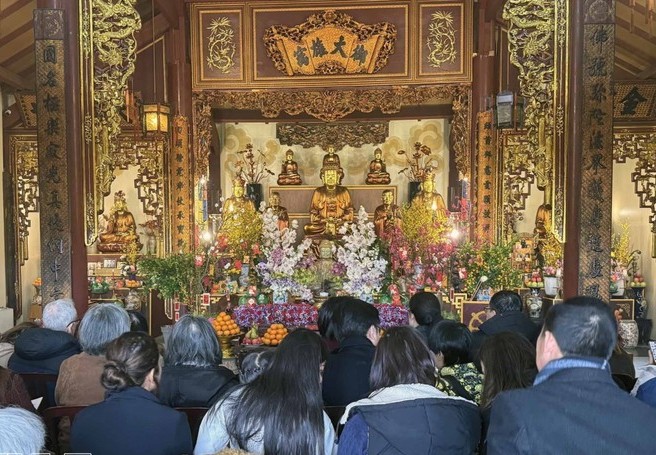 National
National
Vietnam News Today (Feb. 19): Vietnamese in France Cherish Traditional Practices During Tet
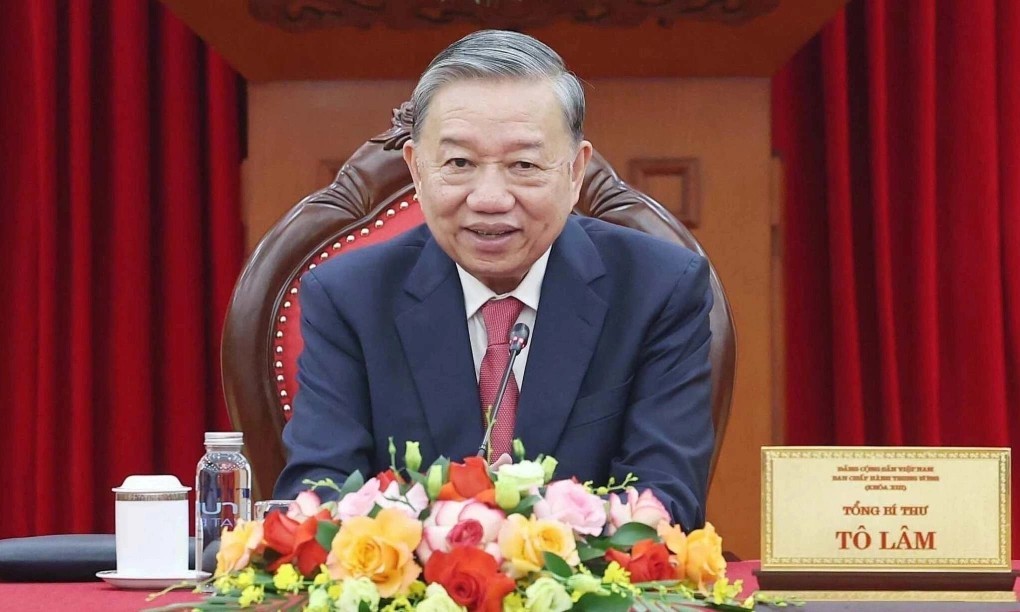 National
National
General Secretary To Lam to Attend Inaugural Meeting of the Gaza Peace Council in the United States
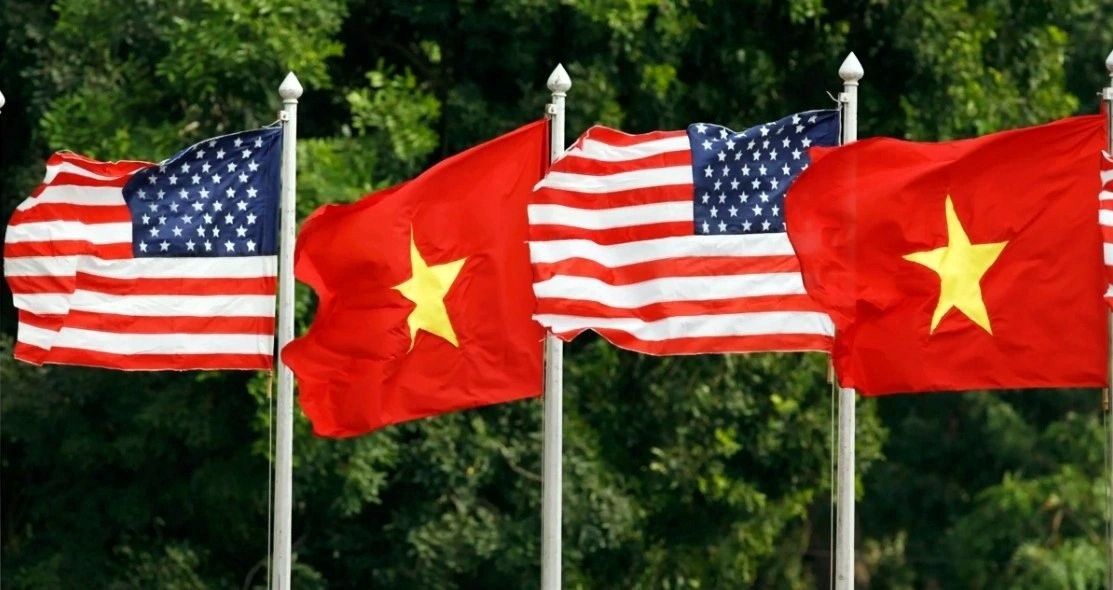 National
National
Vietnam News Today (Feb. 18): Vietnam–US Cooperation: Writing The Next Chapter of Success
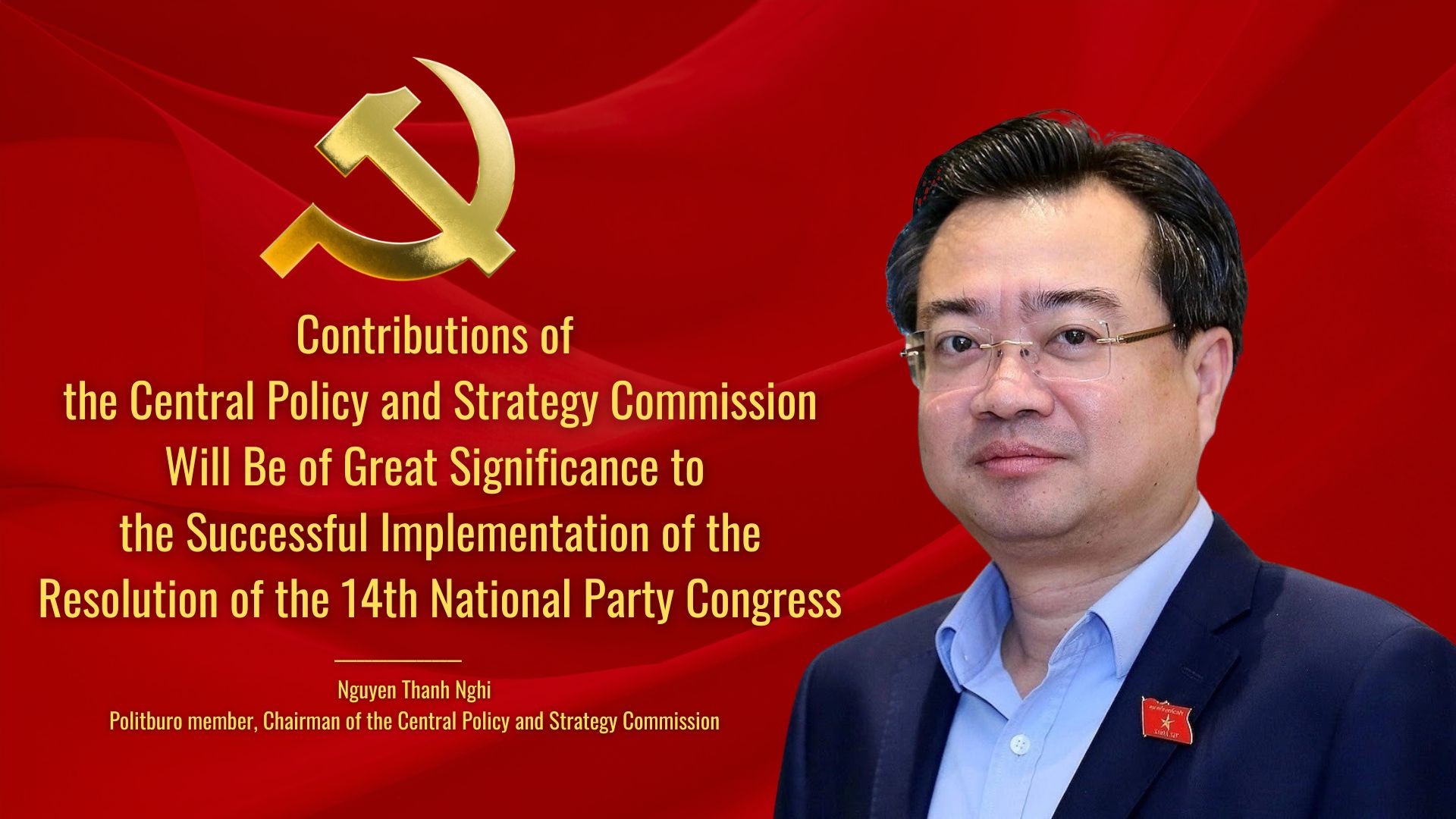 National
National

